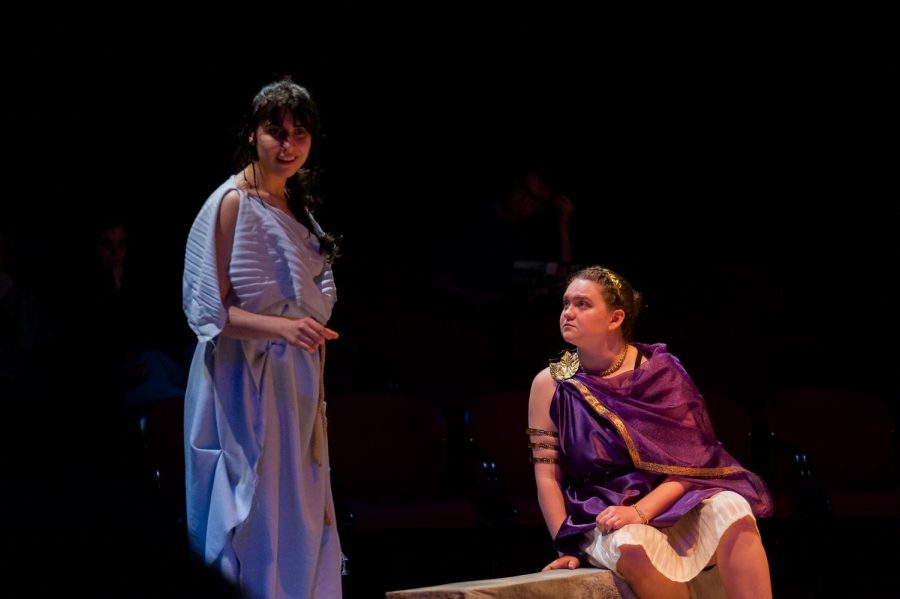Calypso Subverts Classic Mythology with Emotional Immersion
Calypso, written and directed by College fourth-year Jordan Muschler, plays at the Kander Theater April 6, 7, 8, and 9.
“No man is an island,” states the oft-quoted John Donne poem. But in Calypso, a play written and directed by College fourth-year Jordan Muschler, the entire world of titular nymph, played by College third year Graciela Fernandez, is relegated to the island of Ogygia, where she has lived for centuries with only the occasional visits of the god Hermes, played by College first year Finley Taylor, to keep her company. This changes on a stormy night, when a man named Odysseus washes ashore.
Unlike The Odyssey, Calypso focuses on the nymph’s perspective rather than that of Odysseus, played by Ned Bannon. “The original myth was interesting to me because Calypso’s circumstances were so fascinating, and yet she is not given much of her own agency,” Muschler told the Review. “I thought expanding on why she was alone on the island while fleshing out her character could make for a good play, especially since it gave me a chance to tackle loneliness and love in a unique way, with a character I felt a lot of empathy for.”
Calypso gives us an intimate and intense look into her world. The bulk of the play consists of her long conversations with the play’s other two characters, Hermes and Odysseus, that bring out her struggles with loneliness and her desire to connect with others. Additionally, the production includes several live performances of music in which Calypso plays guitar and sings, her lyrics and melancholy voice conveying joy and hurt that dialogue cannot express.
The Kander Theater provides an intimate venue that allows the stellar three-person cast to convey emotional subtlety and intensity and draw us deep into the inner lives of the characters. While the plot is relatively simple, Calypso’s relationships with Hermes and Odysseus are full of complexity. Hermes comes across superficially as a smug, arrogant god, but events in the play reveal emotional vulnerability. This character’s hidden depth shows the strength of the dialogue and its ability to demonstrate intricate character traits. Odysseus is more nuanced and conflicted than he is depicted in The Odyssey. In Calypso, his internal strife is more often shown than stated, demonstrating the strength of the writing and acting.
Muschler’s directing skills are evident in the way he builds mood and atmosphere. The set is simple; a circle of sand, illuminated by marbled light like the reflection of the water that changes to reflect the weather, with a stone arch surrounded in greenery as a backdrop. The dreamy lighting transports us to the idyllic yet miniscule paradise where Calypso is trapped, while sparse musical accompaniment and occasional sounds of waves and rain bring out the silence of her lonely domain. The pacing of the production gives a sense of altered time, reflective of Calypso’s curse of immortality. The scenes are long and move slowly, though they do not drag. Years pass imperceptibly yet believably during the play’s 95 minutes. Rather than including breaks in the narrative, time slips by as the characters are talking, dancing, and singing. The timelessness is also expressed in the section of the rock back- drop covered with chalk dashes that Calypso adds for every day she has remained in Ogygia. The dashes continue to accumulate throughout the play until Calypso wipes them away in a fit of frustration. Muschler’s ability to compress and extend time so art fully speaks to his control of the medium.
Those familiar with The Odyssey will not expect a happy ending to Calypso. However, the production ends on a hopeful rather than despairing note. Calypso’s troubles do not go away, but her spirit of perseverance is not damaged. At one point, Calypso sings a song telling the story of a Greek myth but leaves out the last verse which tells of the hero’s tragic end. Perhaps Muschler’s innovative change to the Greek myth is his omission of a triumphant or tragic ending. Calypso’s meaning is not found in victory or tragic death, but in human persistence amidst the onslaught of time, trials, and tribulations.










